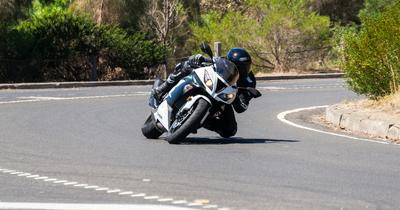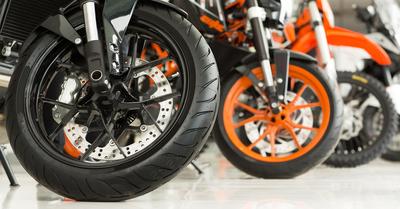600cc Vs 1000cc Motorcycles: A Comprehensive Comparison Guide
The debate between these two classes of bikes has been around for a while, and I've spent some time researching and comparing them to understand their unique characteristics better.
When I first began comparing 600cc and 1000cc motorcycles, I realized there's more to it than just horsepower. It heavily depends on my individual preferences, riding style, and experience level. So, let's dive into some key differences between these two engine classes.
What Is A 600cc Motorcycle?
A 600cc motorcycle typically falls under the category of sports bikes. It is referred to as a middleweight supersport motorcycle. The average 600c bike has 55 to 130 horsepower, providing plenty of burst and power.
These motorcycles feature an engine displacement of 600cc and are known for their agility and balance. From my experience, 600cc bikes are great to ride fast with a maximum speed between 125-160 mph. Only a professional rider should reach top speeds.
The handling is nimble, making them a popular choice for those interested in race track days or twisty roads. Some of the advantages of a 600cc motorcycle include lighter weight, lower cost, and better fuel efficiency compared to their 1000cc counterparts.
This is best used as a performance sport bike rather than a daily commuter. It has lower, no low-down torque, which can be a problem for a beginner. But they can ride faster with better corner speed and it has more than enough power to impress.
What Is A 1000cc Motorcycle?
A 1000cc motorcycle features an engine displacement of 1000cc. This is known as a liter bike. You can expect most of the top 1000cc bikes to have a 4-stroke 4-cylinder DOHC engine and top speeds between 170-186 mph. Motorcycles have a max speed of 186.
These motorcycles boast significantly more horsepower and torque than 600cc models. A 1000cc sports bike has much more horsepower than a 600cc motorcycle but with only marginal differences in weight.
I've found that 1000cc motorcycles deliver more power throughout the rev range, providing a thrilling and adrenaline-pumping riding experience. However, it's important to note that these bikes can be more challenging to handle, especially for inexperienced riders.
Some advantages of a 1000cc motorcycle include superior straight-line acceleration, added stability at high speeds, and more flexibility due to the increased torque. This makes this motorcycle a versatile street bike.
Explaining the Differences Between 600cc and 1000cc Motorcycles
As a motorcycle enthusiast, I've encountered many debates regarding the differences between 600cc and 1000cc motorcycles. Let me walk you through some key differences I've discovered in my experience.
Engine Torque
When it comes to torque, 1000cc bikes have a higher output than 600cc bikes. This means 1000cc motorcycles can accelerate faster and have greater pulling power, especially in lower gears.
I've personally experienced this difference while riding both 600cc and 1000cc motorcycles. With more low-down torque on the smaller bike is noticeable. This means lower chances of spinning the rear tire. For some, it may be too much power, but 1000cc bikes provide a more engaging ride.
Power & Speed
Unsurprisingly, 1000cc motorcycles have larger engines that produce more horsepower, resulting in a faster top speed. In my experience, 600cc bikes aren't far behind in terms of speed and can still pack a punch in the right conditions.
The difference lies in the size of the engine, with the 1000cc bike providing more power and speed, while the 600cc bike is more fuel-efficient.
Fuel Consumption
As someone who has ridden both types of bikes, I can confirm that 600cc motorcycles are generally more fuel-efficient than their 1000cc counterparts.
This is mainly due to their smaller engine displacement and more eco-friendly designs. If saving on fuel is part of your lifestyle, a 600cc bike might be more suitable for you.
Bike Size
Finally, I've found that 600cc motorcycles often have smaller designs and overall dimensions than 1000cc bikes, but this difference is surprisingly small.
This can potentially make them lighter and easier to handle, particularly for inexperienced riders or those looking for more agility during their rides. While some 1000cc bikes can be tamed with the right experience, the smaller size of 600cc bikes will inevitably be more manageable for many riders.
Gear Shifting
Anybody riding a 1000cc bike will tell you how much easier gear shifting is. This is because of the increased torque and lightweight feel.
You must be much more precise while shifting on a 600cc bike. This is another reason why it’s not the best choice for commuters and daily riding.
600cc vs 1000cc Motorcycle Comparison
Let’s compare both bikes to make things a little easier to visualize. The chart below includes the averages for both bike types, including the average speed, dimensions, horsepower, weight, etc.
Yamaha YZF-R6 vs Yamaha YZF-R1 (600cc vs 1000cc)
Now let's be a little more precise. I decided to compare the Yamaha YZF motorcycles. This is a top-rated bike and we look at the 600cc and 1000cc models so you can see the primary differences.
How to Choose a Motorcycle Size
When I started looking for my first motorcycle, I had the same question many beginners face: should I go for a 600cc or a 1000cc bike? I considered several factors such as my riding experience, intended use, and comfort to make the right choice.
I found that as a beginner, starting with a 600cc motorcycle was wise. They tend to be more forgiving and easier to handle. However, everyone's preferences differ.
I learned that it's essential to choose a motorcycle that fits your height and weight to ensure safety and confidence on the road. One key factor I kept in mind was the purpose of my motorcycle.
For example, I didn't need a powerful engine if I wanted to commute during weekdays and enjoy the occasional weekend ride. A 600cc bike was more suitable for my needs. It's important to test-ride different motorcycles to find the perfect match.
Sometimes a 1000cc motorcycle felt better on the road, while other times, a 600cc bike felt more nimble and responsive. I urge riders to consider the running costs, insurance premiums, and maintenance requirements of 600cc and 1000cc motorcycles.
Can You Beat a 1000cc Motorcycle with a 600cc?
The top speed on a 1000cc motorcycle will be higher than a 600cc one. A 1000cc motorcycle has more power than a 600cc one too. However, the rider can make a significant difference.
A skilled rider on a 600cc bike could potentially outperform a less experienced rider on a 1000cc bike. This made me realize the importance of factors like:
- Rider skill level
- Handling capabilities
- Weight distribution
- Terrain
For example, if we're talking about tight corners and twisty roads, a 600cc motorcycle might have a handling advantage due to its lighter weight, allowing me to take corners more smoothly and quickly.
Another interesting point is the difficulty of managing power on a 1000cc motorcycle, especially for riders with less experience. With my current skill level, I might find it hard to get the power down efficiently on a larger bike.
So, could I beat a 1000cc motorcycle with a 600cc one? I'd say it's possible under certain conditions and with the right riding skills. But it also makes me reflect on the importance of focusing on technique and gaining experience rather than just chasing raw power.















